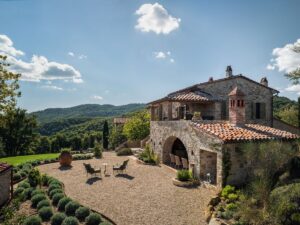Villa properties around the world are not only beautiful and luxurious, but they also often have deep cultural and historical significance. These properties offer a unique opportunity for guests to experience the rich history and culture of their destination, while also enjoying the ultimate in comfort and luxury. In this article, we will explore the cultural and historical significance of villa properties around the world.
Cultural and Historical Significance of Villa Properties around the World
Italian Renaissance Villas
Italy is home to some of the most beautiful and historically significant villa properties in the world, particularly those from the Renaissance period. These villas were built during the 15th and 16th centuries, and were often commissioned by wealthy and powerful families as a way to display their wealth and status. Many of these villas are located in the Tuscan countryside and feature stunning architecture, beautiful gardens, and impressive works of art.
French Chateaux

France is known for its grand chateaux, which were built during the Middle Ages and Renaissance periods. These properties were often built as fortified castles or palaces, and were used as residences for the nobility and royalty. Many of these chateaux have been converted into luxury villa rentals, offering guests the opportunity to experience the grandeur and opulence of French history and culture.
Spanish Haciendas
In Spain, haciendas are large estates or plantations that were built during the colonial period. These properties were used for agriculture or mining, and often featured grand houses or villas for the estate owners. Many of these haciendas have been converted into luxury villa rentals, offering guests the opportunity to experience the unique blend of Spanish and colonial culture and history.
Moroccan Riads
Moroccan riads are traditional houses or palaces that are built around a central courtyard or garden. These properties are often decorated with intricate tile work, carved woodwork, and other decorative elements that reflect the rich cultural heritage of Morocco. Many of these riads have been converted into luxury villa rentals, offering guests the opportunity to experience the beauty and culture of Morocco in a luxurious and comfortable setting.
Balinese Villas
Bali is known for its stunning villas, which often feature traditional Balinese architecture and design elements. These properties are often built using local materials such as bamboo and thatch, and feature open-air living spaces that allow guests to fully immerse themselves in the natural beauty of the island. Many of these villas also feature traditional Balinese art and decor, providing guests with a unique cultural experience.
Mexican Haciendas
In Mexico, haciendas are large estates or plantations that were built during the colonial period. These properties were used for agriculture or mining, and often featured grand houses or villas for the estate owners. Many of these haciendas have been converted into luxury villa rentals, offering guests the opportunity to experience the unique blend of Mexican and colonial culture and history.
Greek Villas
Greece is home to many beautiful villas that offer guests the opportunity to experience the rich cultural heritage of the country. These villas often feature traditional Greek architecture and design elements, such as whitewashed walls, blue shutters, and terracotta roofs. Many of these villas are also located near historic sites and ancient ruins, allowing guests to explore the rich history and culture of Greece.
Moreover, villa properties around the world often offer a unique opportunity for guests to learn about local customs and traditions, as well as to experience the local cuisine and way of life. Many villa rental companies offer customized cultural experiences and tours, allowing guests to fully immerse themselves in the local culture and way of life. This may include cooking classes, wine tastings, local tours, and cultural experiences such as traditional dances or music performances.

In addition, villa properties can also play an important role in preserving and showcasing local cultural heritage. Many villa properties are located in historic or culturally significant buildings, and have been restored and preserved to maintain their original beauty and architectural significance. By staying in these properties, guests can help to support the preservation of these important cultural landmarks and contribute to the local economy.
Furthermore, villa properties can also provide important economic benefits to local communities. By renting out their properties to guests, villa owners and property managers can contribute to the local economy and provide jobs and income to local residents. Additionally, many villa rental companies work with local businesses and organizations to promote sustainable tourism practices and support responsible and ethical business practices.
It is important to note that the cultural and historical significance of villa properties around the world also presents some challenges and risks, including the need to ensure that these properties are preserved and maintained for future generations. Villa owners and property managers must work to ensure that their properties are properly maintained and preserved, and that they are not contributing to the destruction or degradation of local cultural heritage.
Moreover, villa owners and property managers must also be sensitive to local customs and traditions, and ensure that their guests are respectful of these traditions and do not engage in activities that could be considered disrespectful or offensive. This may include dress codes, behavioural norms, and other cultural practices that may differ from those in the guest’s home country.
Finally, villa owners and property managers must also ensure that their properties are accessible and welcoming to guests from all backgrounds and cultures. This may include offering customized experiences and amenities that cater to the unique needs and preferences of guests from different cultural backgrounds, as well as ensuring that the property is accessible and inclusive to guests with disabilities or other special needs.
In conclusion, villa properties around the world offer a unique and immersive way to experience the rich cultural and historical significance of their destination, while also enjoying the ultimate in comfort and luxury. By preserving and showcasing local cultural heritage, supporting the local economy and community, and providing customized cultural experiences and amenities, villa owners and property managers can create a truly unforgettable vacation experience that promotes cultural understanding and appreciation, while also contributing to the preservation and sustainability of local communities and cultural heritage.






